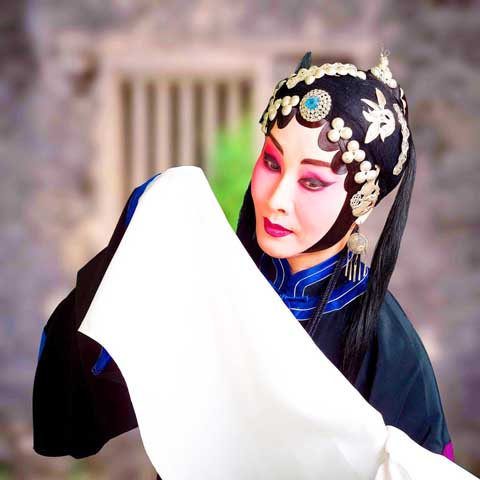Sitar diva Anoushka Shankar made a big impact on the few people who were actually listening at the National Concert Hall last Tuesday. The audience was pitifully small, rattling around in the huge space of the auditorium, and it is a credit to Shankar's sextet that they managed such a profoundly joyful and energetic performance.
Shankar performed brilliantly but was somewhat overshadowed by tabla player Tanmoy Bose, who was a vibrantly charismatic presence on stage. Shankar looked glamorous and played with great skill, but she seemed a little wooden during the first three-quarters of the show and only loosened up toward the end, when she revealed that she, too, could have considerable presence. It was just a pity she had not let it show earlier in the concert.
The performance began with a traditional piece, then immediately struck out for new territory with an arrangement by Shankar of a piece by her father, the legendary sitar player Ravi Shankar, that was originally composed as a duet for sitar and cello. She had arranged the piece for her sextet, which included cello and piano players Barry Philips and Leo Dombecki. It was an indication of Shankar's skill as a composer and arranger that these instruments never felt out of place in a group that was otherwise composed of sitar, tabla, Indian flute, and tanpura, an Indian drone instrument.

PHOTO: COURTESY OF THE WEI HAI-MIN CHINESE OPERA FOUNDATION
The highlight was an original piece by Shankar that incorporated Flamenco piano. She merged the Indian and Iberian strands seamlessly, and this served as a wonderful demonstration of the unique elements that she has brought to traditional Indian music.
Wei Hai-min (魏海敏), on the other hand, had no problem packing the auditorium at the Metropolitan Hall for Regrets of Life and Death (生死恨), an opera by Beijing opera legend Mei Lanfang (梅蘭芳). While Wei is known for breaking conventions and starring in performances designed to bring a younger audience to opera, Thursday night's show was traditional, with few concessions to contemporary sensibilities. This was reflected in the audience, which was mostly well past middle age, but they gave Wei the kind of highly vocal support worthy of a much younger crowd.
Performers from Beijing's Beijing Opera Troupe (北京京劇院) and the Shanghai Beijing Opera Troupe (上海京劇院) added depth to the lineup, and even relatively minor roles were performed by first-tier actors.
The story of Regrets of Life and Death had all the heavy-handed morality and elevated nationalistic sentiments that are an inseparable part of traditional Beijing opera, but it wasn't the story that people where there to see. Wei showed off the dignified elegance and grace that is the hallmark of the Mei Lanfang school of performance, and was cheered ecstatically throughout.

Behind a car repair business on a nondescript Thai street are the cherished pets of a rising TikTok animal influencer: two lions and a 200-kilogram lion-tiger hybrid called “Big George.” Lion ownership is legal in Thailand, and Tharnuwarht Plengkemratch is an enthusiastic advocate, posting updates on his feline companions to nearly three million followers. “They’re playful and affectionate, just like dogs or cats,” he said from inside their cage complex at his home in the northern city of Chiang Mai. Thailand’s captive lion population has exploded in recent years, with nearly 500 registered in zoos, breeding farms, petting cafes and homes. Experts warn the

The unexpected collapse of the recall campaigns is being viewed through many lenses, most of them skewed and self-absorbed. The international media unsurprisingly focuses on what they perceive as the message that Taiwanese voters were sending in the failure of the mass recall, especially to China, the US and to friendly Western nations. This made some sense prior to early last month. One of the main arguments used by recall campaigners for recalling Chinese Nationalist Party (KMT) lawmakers was that they were too pro-China, and by extension not to be trusted with defending the nation. Also by extension, that argument could be

Aug. 4 to Aug. 10 When Coca-Cola finally pushed its way into Taiwan’s market in 1968, it allegedly vowed to wipe out its major domestic rival Hey Song within five years. But Hey Song, which began as a manual operation in a family cow shed in 1925, had proven its resilience, surviving numerous setbacks — including the loss of autonomy and nearly all its assets due to the Japanese colonial government’s wartime economic policy. By the 1960s, Hey Song had risen to the top of Taiwan’s beverage industry. This success was driven not only by president Chang Wen-chi’s

Last week, on the heels of the recall election that turned out so badly for Taiwan, came the news that US President Donald Trump had blocked the transit of President William Lai (賴清德) through the US on his way to Latin America. A few days later the international media reported that in June a scheduled visit by Minister of National Defense Wellington Koo (顧立雄) for high level meetings was canceled by the US after China’s President Xi Jinping (習近平) asked Trump to curb US engagement with Taiwan during a June phone call. The cancellation of Lai’s transit was a gaudy